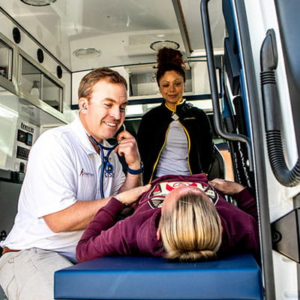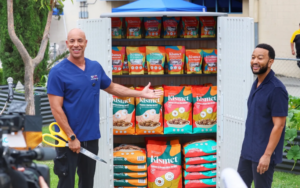Care Beyond the Boulevard delivers essential medical services to Kansas City’s homeless and uninsured communities, expanding from a volunteer-run mobile clinic to a vital healthcare provider filling gaps left by recent clinic closures.
The Birth of a Mobile Mission

Care Beyond the Boulevard (CBB) began in 2016 as a vision of Jaynell “KK” Assmann, a registered nurse who recognized a critical need while volunteering at a food ministry. What started as medical care delivered from the back of a pickup truck has evolved into a comprehensive healthcare service for those living outside the traditional healthcare system.
In 2018, CBB transformed a donated school bus into “The Big Green Bus,” a fully functional mobile clinic that dramatically improved their visibility and capacity to serve patients. From treating chronic conditions like diabetes and hypertension to addressing acute issues such as frostbite and infections, the mobile clinic brought medical care directly to those who needed it most.
Growth Through Necessity
The organization experienced steady growth between 2018 and 2022, expanding from solely mobile operations to include stationary clinics and adding specialized staff members. By 2021, CBB had five full-time employees, began offering COVID-19 vaccinations, and helped patients navigate the newly expanded Missouri Medicaid system.

This gradual expansion accelerated dramatically in 2024 when the Duchesne Clinic in Kansas City, Kansas abruptly closed. Duchesne, a nonprofit health center serving approximately 2,000 patients—many unhoused, uninsured, and Spanish-speaking—was given just six weeks to shut down operations after its parent organization, Caritas Clinics, was acquired by Utah-based Intermountain Health.
Filling the Gap
Facing this healthcare crisis, former Duchesne staff, including Assmann and Spanish translator Gustavo Martinez, worked to transform CBB to absorb the influx of vulnerable patients. Despite having fewer than 10 full-time employees (compared to dozens at Duchesne), CBB expanded services to include dental care and increased the number of locations they serve throughout the metro area.
Winter brought additional challenges, with CBB adding services at cold weather shelters across the city as severe storms brought freezing temperatures and heavy snowfall. The clinic prioritized maintaining vital in-person translation services, which Martinez notes are crucial for building trust with communities hesitant to seek medical care.

“I know a lot of my friends, a lot of my family members, don’t go to the clinic, because either they don’t know about the clinics, they’re scared, they’re uninsured, they’re undocumented,” Martinez said in an interview with KCUR. “That’s huge. If you can’t check up on your health, then you never know what’s gonna happen.”
Despite their efforts to fill the void left by Duchesne’s closure, the loss of established community connections remains significant. As Martinez reflected, “I still occasionally bump into my former patients, in the stores or just out in the community, and I’m able to say ‘Hi’ to them, but it’s just not the same.”
While the closure of Duchesne created significant challenges, CBB has demonstrated remarkable resilience and commitment to their mission of healthcare equality. The organization continues to adapt and expand its services to meet the community’s needs, creating a healthcare model that goes beyond traditional boundaries.
As stated in their mission, CBB remains dedicated to “becoming a force for health care equality and social change,” bringing quality medical care directly to those who need it most—regardless of their circumstances.
Read more about CBB in this article by Josh Marvine for KCUR: A nonprofit health clinic closed in Kansas City, so these workers took their operation mobile
Watch this video from May 2024 about CBB’s work on the street:
Related Articles

Street Medicine’s New Frontier: Bringing Psychiatric Care to LA’s Homeless
Dr. Shayan Rab and the Los Angeles County Homeless Outreach & Mobile Engagement (HOME) program are revolutionizing mental health treatment by bringing psychiatric care directly to those living on the streets.

A California Medical Group Treats Only Homeless Patients — And Makes Money Doing It
Healthcare in Action, a California medical group that exclusively serves homeless people, has tapped into growing demand and funding for street medicine services. Three years in, the innovative nonprofit is raking in revenue and serving thousands of people who otherwise might flock to the hospital for high-cost care.

Pet Food Pantry Brings Hope to Long Beach’s Homeless Pet Owners
Project Street Vet, founded by Dr. Kwane Stewart, partnered with musician John Legend’s pet food brand Kismet to open a pet food pantry at Long Beach’s Multi-Service Center, providing essential support for homeless individuals and their animal companions.
